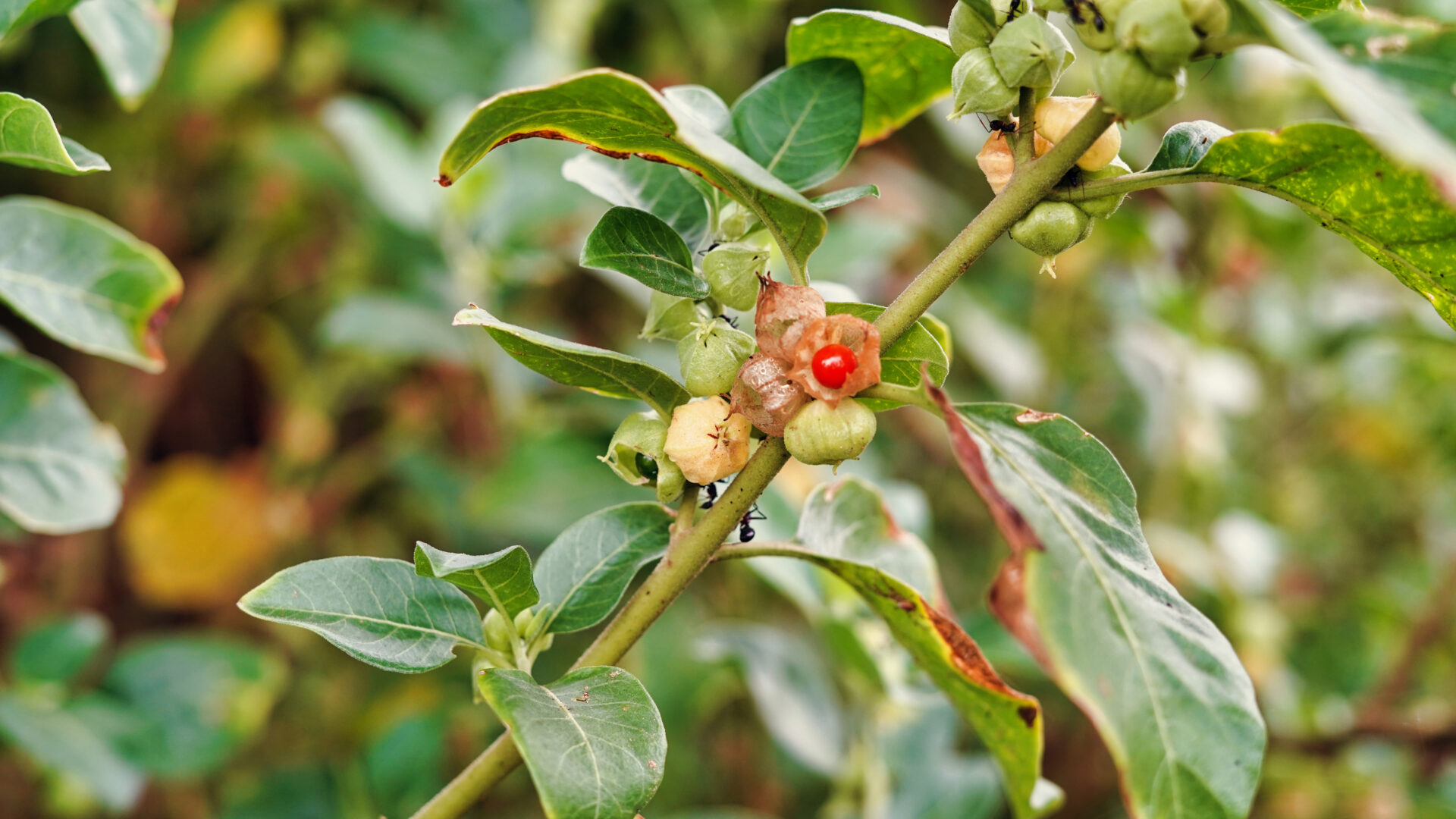Ashwagandha, scientifically known as Withania Somnifera, is an evergreen shrub native to India. For millennia, it has been used in Ayurvedic medicine for its adaptogenic and tonic properties. This plant is highly valued for its supposed benefits on physical and mental resilience during stressful situations. Recently, interest in this plant has grown in the nutraceutical field, especially in the formulation of supplements. Let’s explore the characteristics and properties that make this plant so special.
What is Ashwagandha?
Ashwagandha is known as “Indian ginseng”, winter cherry, and poisonous gooseberry. It belongs to the Solanaceae family, featuring sturdy roots and oval-shaped leaves. The extract derived from its root has been used since ancient times in traditional Indian (Ayurvedic) medicine. Its name comes from combining two Sanskrit words: “ashva”, meaning horse, and “gandha”, meaning smell. It is believed that the name refers to the root’s smell, reminiscent of a horse, and the plant’s ability to provide strength and vitality.
Ashwagandha is native to India but has also been cultivated in other parts of Asia and the Middle East. Today, its roots are used worldwide in dietary supplements and other nutraceutical products due to the various beneficial active ingredients they contain.
The active ingredients in Indian ginseng
The main active compounds in Ashwagandha extract are withanolides, a group of steroidal lactones known for their antioxidant, anti-inflammatory, and neuroprotective effects. According to tradition and some preliminary studies, these compounds can modulate cortisol levels, also known as the stress hormone, helping to improve the individual’s physical and mental well-being. Additionally, this plant is said to positively impact the immune and endocrine systems, regulating thyroid hormone production and promoting recovery after intense physical activity or stressful situations.
However, it is important to note that studies on the benefits of Ashwagandha are still in the preliminary stages, and more advanced research is needed.
Uses of Ashwagandha in nutraceuticals
Ashwagandha has been included in various nutraceutical supplements, particularly in capsule or powder form, which can be mixed with soft foods. Its most studied benefits include:
- Stress and Anxiety Management: The plant is credited with adaptogenic properties, meaning it helps the body cope with stress. Some randomized, placebo-controlled clinical trials suggest Ashwagandha helps regulate stress mediators, including heat shock proteins (Hsp 70), cortisol, and c-Jun N-terminal kinase (JNK-1).
- Improvement of Cognitive Function and Sleep: According to a study of 58 participants, controlled doses of Ashwagandha significantly improved sleep quality. Other preliminary studies, based on small samples of adults, showed cognitive improvements, especially in memory, reaction time, and information processing speed. These results are attributed to the plant’s potential antioxidant properties.
- Support for Physical Health: The plant is indicated to improve muscular endurance and enhance athletic performance, according to research analyzing 12 studies on humans. For this reason, it can be a valuable aid for athletes during physical activity, facilitating post-workout recovery.

Other therapeutic uses and precautions
Beyond its most known benefits, Ashwagandha has been linked to various other qualities, such as reducing blood sugar levels, increasing testosterone, and anti-inflammatory effects. However, these benefits are currently supported by preliminary studies conducted on small samples or animals, so it is always recommended to consult a medical professional before using Ashwagandha.
As for its usefulness in treating mental disorders like schizophrenia, bipolar disorder, or depression, although some studies suggest beneficial effects, it is important to highlight that the plant cannot replace pharmaceutical treatments, and further research is needed. In general, Ashwagandha supplements are not recommended for pregnant or breastfeeding women, cancer patients, those with autoimmune diseases, liver conditions, or those taking other medications.
Ashwagandha in nutraceuticals with Flarer
With its rich history, this plant is part of the high-quality raw ingredients portfolio we supply to the nutraceutical and pharmaceutical industries. We collaborate with certified suppliers to ensure the safe distribution of plant extracts that comply with international regulatory standards. Additionally, we actively support R&D labs in nutraceutical companies interested in exploring the properties of Ashwagandha. Thanks to our decades of experience, we offer personalized services that help our clients in every phase of the supply chain, from transportation to regulatory consultancy. To learn more about our products and services, contact us for a personalized consultation with our experts.
